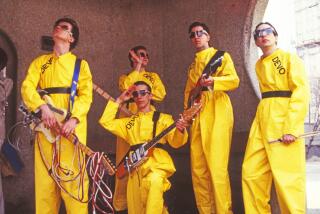POP MUSIC REVIEW : Genesis Mainstay Proves Craftsman in Own Band
- Share via
What is it that the bumper sticker says: “When the going gets weird, the weird turn pro”? If there is any credence to that, the ‘80s must be one weird time.
In the ‘70s, Genesis was about as odd and cultish a band as one could ask for, unless one was into trepanned skull caps and lyrics in Esperanto. Peter Gabriel sported a reverse Mohawk and sang about playing croquet with human heads, while the band reveled in quasiclassical art-rock excursions. The closest thing to an outside career pursued by any of the group was drummer Phil Collins’ polyrhythmic visits with the even more avant-garde Brand X.
Collins has since developed a grindingly effective pop sensibility, and Gabriel has proved that he can hit the Top 10 while still keeping a foot in uncharted territory, but it may yet be Genesis’ unassuming bassist-guitarist, Mike Rutherford, who proves the most canny pop craftsman of the bunch. The music his Mike + the Mechanics brought to the Pacific Amphitheatre on Sunday never veered from the mainstream of accessible, radio-ready pop, yet the six-piece group packed a lot of feeling and content into that limited form.
It helped in no small amount that the Mechanics include one of Britain’s most soulful singers, Paul Carrack (the voice of Ace’s pub-rock classic “How Long” and Squeeze’s “Tempted”). Combined with fellow vocalist Paul Young (no, not the Paul Young) and a rich choral backing from most of the band, the emphasis on voice kept the 13-song set tilted toward the human and emotional.
That was not always without effort. In addition to the electronic drums, guitar synthesizers and such, many of the songs used pre-programmed bass and rhythm tracks. While that beefed the arrangements to match the group’s studio sound, it also lent a locked-in, clinical feeling to some songs. But even when particularly at odds with the feel of the material, as on the ballad “Nobody Knows,” the warmth of Carrack’s rough-grained voice won out.
More of an overt showman, Young was best singing on the up-tempo “All I Need Is a Miracle” and “Taken In.” Aside from a loud jacket, bandleader Rutherford was scarcely less taciturn than when he performs with Genesis, only singing backup and leaving most of the flash guitar work to Tim Renwick.
When Rutherford did solo, as on “Nobody Knows,” it was typically with an understated melody that served the song rather than stood out from it.
The Mechanics’ songs can be fairly devious things, packing more intent than the standard radio fare. Live, “Silent Running” came off as a forceful, angry statement against the institutions that control peoples’ destinies (curiously, an encore version of the Beatles’ “Revolution” seemed wan and lifeless).
The show’s real depth charge was Carrack’s vocal on the hit “The Living Years,” a genuinely touching ballad about bridging the generations. It also presented the evening’s greatest man-vs.-technology challenge, as Carrack had to work against a pre-recorded majestic chorus that flew in the face of the direct, “eye-to-eye” message of the lyric.
Outfield, the opening band, had its most entertaining moment during the Mechanics’ performance, when its three members sprinted across the stage in a bit of last-night-of-the-tour glee, wearing only towels and shaving cream. They might as well have been wearing diapers during their own set, which sounded like nothing so much as a watered-down version of the Babys’ preambulant pop.
More to Read
The biggest entertainment stories
Get our big stories about Hollywood, film, television, music, arts, culture and more right in your inbox as soon as they publish.
You may occasionally receive promotional content from the Los Angeles Times.










